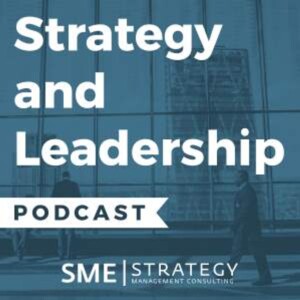
Monday Mar 17, 2025
OKRs & Performance Culture: Interview with Ben Lamorte of OKRS.com
In this episode of the Strategy and Leadership Podcast, Anthony Taylor chats with Ben Lamorte, an OKR expert, to break down how to actually make progress and drive measurable outcomes. Think OKRS explained without pretense.
Ben, who's been helping teams nail their goals for years, reveals a major pitfall: treating OKRs as mere to-do lists. He'll show you how to ditch the vague "to-dos" and start setting goals that are actually measurable, like "Increase website traffic by 20% in Q3" instead of just "Launch a new marketing campaign." Plus, he'll explain why knowing why your goals matter is just as important as what they are.
Anthony and Ben talk about how to move away from just "doing what you're told" and towards a team that's focused on real results. Ben shares easy-to-follow tips on how to communicate your goals to your boss and how to tweak your OKRs to make sure they're working for your team in your strategic planning and strategy implementation..
We'll also dive into the importance of change management and stakeholder engagement. Successfully implementing OKRs requires more than just a framework; it demands a shift from compliance to a performance-driven environment. Learn how to effectively communicate the benefits of OKRs, address resistance, and foster a sense of ownership and accountability-- and how a skilled strategic planning facilitator or strategic planning consultant can guide teams to define and track relevant metrics, ensuring alignment throughout the strategic planning process.
We discuss how to drive performance through effective OKRs by focusing on measurable outcomes and building a culture of accountability. Ben emphasizes the iterative nature of OKRs, suggesting you think of them like "rough drafts." The real value is in learning from what didn't work and quickly changing course.
Key Takeaways:
- OKRs require practical application beyond theoretical training.
- Common mistakes include treating OKRs as to-do lists.
- Effective OKRs focus on measurable outcomes, not just activities.
- Change management is crucial for successful OKR implementation.
- Communication of objectives should start with the end goal in mind.
- Compliance work does not align well with the OKR framework.
- Iterative processes allow for learning and adaptation in goal setting.
- Quality of outcomes is more important than quantity of tasks.
- Support and coaching are essential for mastering OKRs.
- Organizations should embrace a performance-oriented culture.
Chapters:
- 00:00 - Introduction to OKRs and Their Importance
- 02:48 - Common Mistakes in Implementing OKRs
- 06:02 - The Role of Change Management in OKRs
- 08:55 - Compliance Culture vs. Performance Culture
- 11:56 - Effective Communication of Objectives
- 14:59 - Iterative Nature of OKRs
- 17:46 - Conclusion and Resources
Learn More About OKRs: Visit Ben Lamorte at www.OKRS.com
// Connect with us:
► Contact us: https://www.smestrategy.net/contact
► Connect with Anthony on LinkedIn: https://www.linkedin.com/in/anthonyctaylor604/
// About SME STRATEGY CONSULTING: SME Strategy is a management consulting firm that specializes in helping organizations develop and implement their strategic plans. We work with teams to facilitate conversations about strategic direction and business strategy so that our clients can focus their energy on what will move them forward faster.
► Work with us: Are you looking for someone to facilitate your strategic planning process? https://www.smestrategy.net/strategic-planning-facilitator
No comments yet. Be the first to say something!